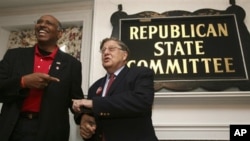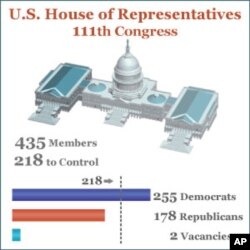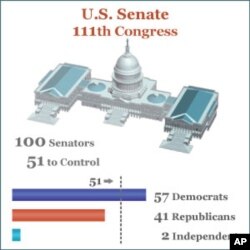Political experts say all signs point to major Republican Party gains in U.S. congressional midterm elections set to take place in less than one week on November 2. The latest public opinion surveys, fundraising totals and analysts' predictions seem to favor Republicans as they seek to win back control of Congress, which they lost to Democrats in 2006.
Public opinion polls show Republicans have momentum heading into Tuesday's elections. But that has not stopped President Barack Obama from making an intense last-minute appeal for support for Democratic candidates.
Mr. Obama appeared on The Daily Show with Jon Stewart, a comedy television program popular with young people in the United States. While on the show, he defended the record of his administration's first two years in office.
"The presumption is, well, we did not get 100 percent of what we wanted," Mr. Obama said. "We got 90 percent of what we wanted, so let us focus on the 10 percent we did not get, as opposed to the 90 percent that we did."
A similar message is being delivered on the campaign trail by former Democtatic President Bill Clinton.
"And I personally believe both the president and the Congress have done a better job than most people think they have done," said the former president.
But Republican leaders believe the political energy and momentum is on their side this year, just as it was with the Democrats in 2006 and 2008.
Be prepared for a change in power the day after November 2, says Chairman of the Republican National Committee, Michael Steele.
"I think you are going to see a wave, an unprecedented wave, on Election Day that is going to surprise a lot of people," Steele said.
Democrats insist they are closing what they call the "enthusiasm gap" with Republicans by urging young and minority voters to turn out at the polls.
But many political experts predict that Republicans will win back control of the House of Representatives, while falling just short of winning a majority in the Senate. Republicans need a gain of 39 seats to take the House and 10 seats to win back the Senate.
University of Virginia political expert Larry Sabato publishes a weekly newsletter called The Crystal Ball. Sabato believes that Republicans will win 55 House seats. Several other analysts also predict Republican gains in the House of between 40 and 60 seats.
A new survey from The New York Times newspaper and CBS News finds that support for President Obama and the Democrats has slipped among some key voting groups that helped them win in 2008, including women, independent voters and less-affluent Americans.
Karlyn Bowman at the American Enterprise Institute Washington monitors public opinion.
"The polls show that Americans have lost much of the confidence that they had in the Democrats when the Democrats took control of the House and Senate in 2006." But Bowman adds, "Their confidence in the Republicans is not high."
The public's poor view of the national economy remains the main source of trouble for Democrats this year, says Thomas Mann, a scholar at the Washington-based Brookings Institution, who was a recent guest on VOA's "Press Conference, USA" program.
"Are things getting better or not? And right now, they feel as if things are not getting better, certainly not rapidly enough to ease the economic gloom. And that is why the president's ratings have declined and that is why the Democrats are in serious trouble," said Mann.
Facing a difficult national political climate, Democrats are trying to focus voter attention on individual Republican candidates they say are too extreme, especially some endorsed by the grassroots conservative and libertarian Tea Party movement.
Nathan Gonzalez monitors House and Senate races for The Rothenberg Political Report, a non-partisan political newsletter. "The fundamental battle in this election, I think, is about whether it is a referendum or a choice," said Gonzalez. "And Democrats are trying to localize elections all over the country."
More than 30 states offer some form of early voting and millions of Americans have already cast their ballots.
This year's campaigns have been some of the costliest ever. Independent monitoring groups estimate that as much as $4 billion will be spent by candidates, parties and independent fundraising groups by the time the elections are over.






